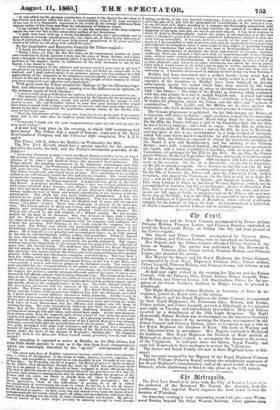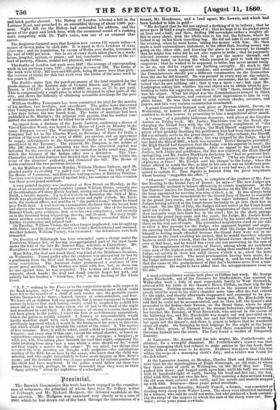,ohs 311rtropolis,
The Poor Law Board is at issue with the City of London Union as to the exclusion of the Reverend Mr. Pocock, the chaplain, from the workhouse. The imperial Board requires the local board to wait the decision of Whitehall.
On Saturday evening a very interesting event took place near Worm- wood Scrubs, beyond the Great Western Railway, where gipsios mop
and brick garths abound. The Bishop of London selected a hill in the Latimer Road, and preached to an assembled throng of about 1500 per- sons. Night fell ere the Bishop had concluded his address, and the scene of the gipsy and brick fires, with the occasional sound of a rushing train competing with Dr. Tait's voice, was one of an unusual cha- racter.
The Registrar-General says that London now covers 121 square miles—a square of eleven miles to each side. It is equal to three Londons of sixty years ago ; and its population, by excess of births over deaths, increases at the rate of 1000 per week. One in six of every death takes place in a work- house, hospital, asylum, or prison ; sad but conclusive evidence of the ex- tent of poverty, disease, mental and physical, and crime.
The deaths of London last week were 1047: the average of corresponding week in ten previous years, 1237 ; showing a decrease of 190. The births of the week were 1752 ; 921 boys and 831 girls, being 90 more boys than girls : the increase of births for this last week over the births of the same week in ten years is 189. The Builder states that the purchase-money of the land required for the goods-station at the Eastern side of Victoria Street, and North of West Street, is 179,1571., which is about 3.5,000/. an acre, or 71. 5s. per yard. This is comparatively a small price to what is obtained in other parts of the city, and shows the difficulty of obtaining accessible dwellings for the poor at moderate rents.
William Godfrey Youngman has been committed for trial for the murder of his mother, two brothers, and sweetheart. The police have discovered that Youngman insured the life of Miss Streeter in the Argus Office for 1001. a few days before she was found dead. The banns of marriage had been published at St. Martin's ; the prisoner still persists that his mother com- mitted the murders, and that he killed her in self-defence.
An appeal from a decision of the Lords Justices, confirming a decree of Vice-Chancellor Wood, was heard in the House of Lords on Monday in the cause Simpson versus The Westminster Palace Hotel Company. The Company had let to Sir Charles Wood, as Secretary of State for India, a portion of the new hotel at a rent of 60001. per annum, and an agreement to supply refreshments to the Government clerks at a tariff of charges sanctioned by the Treasury. The plaintiff, Mr. Simpson, is the holder of fifty 101. shares, and his contention was that the subscribed capital was intended for the erection of an hotel to be carried on in the usual way, from which the tenancy of the Indian office was a deviation. The Vice- Chancellor and Lords Justices had decided that the tenancy was within the scope of the directors' authority, and dismissed the bill. The House of Lords confirmed the two previous decisions.
At the Middlesex Sessions on Monday, William Thomas Jackson, aged 58, pleaded guilty to stealing "a paltry coat or two," from the lobby of the the House of Commons, and first-class waiting-rooms at Railway Stations. Previous convictions were proved against him ; his sentence on this occasion was three years penal servitude.
A very painful inquiry was instituted at Bow Street on Monday, in the form of an accusation of manslaughter against William Slater, recently one of the attendants of Colney Hatch Asylum, arising out of the death of William Swift, a lunatic inmate. 13p to five o'clock on Saturday the 14th of May Swift was physically healthy ; between seven and eight o'clock, Mr. Tyer- man, the medical officer, was sent for to " the padded room," where he found poor Swift dead. A oustruortem examination disclosed that the breast bone and eleven ribs were fractured, besides other injuries. One of the inmates, Samuel Clark, gave evidence, first as to his own competency, and secondly as to the deceased being tripped-up, thrown, and ill-used. His story impli- cates another attendant named Vivian. Mr. Henry remanded Slater for further examination and refused bail.
On Tuesday, William Vivian, the other keeper implicated, was brought up with Slater, and the charge of cruelty at Colney Hatch reheard and resumed. Another inmate, William Varney, was examined : the defendants were both remanded.
Dr. Gourley of Edinburgh has been remanded upon a charge under the Fradulent Trustee Act, of having misappropriated part of the trust funds under the will of the late Mr. Samuel Rigg, solicitor, at Canterbury. Mr. Humphreys stated that a complete answer to the charge would be given.
Mary Riley, the deaf and dumb thief, was tried at the Middlesex Sessions, on Wednesday. Found guilty after the evidence was interpreted to her by a gentleman from the Deaf and Dumb Asylum, proof was offered of pre- vious convictions. The Assistant Judge pronoueced a sentence of five years' penal servitude. Her brother was tried with her, but, as there was no case against him, he was acquitted. The brother and sister, about to separate, shook hands ; the deaf and dumb convict forgot her part, and audibly bid her brother a " Good-bye, Pat," in the hearing of the whole Court.
" S. P.," writing to the Times as to the conjectures made with respect to the Road murder, says—" In conjecturing the circumstances which could have led to the murder of a child of such tender age, the probable causes reduce themselves to three,--hatred, lunacy or somnambulism, and fear. We have all as children had our quarrels, but it seems repugnant to human nature to believe that such lasting enmity could be inspired by a child five years old as to lead to his being taken out of bed in the dead of the night and murdered in cold blood. In the absence of stronger reasons than have yet been given to the public, I reject the first or melodramatic supposition, which the police so readily adopted. 2. Lunacy or somnambulism would hardly manifest itself with such startling results, unless symptoms had previously appeared which it would be the business of the police to discover, and which would go far to identify the author of the crime. 3. The motive of fear remains. How, it will be asked, could a child so young inspire fear ? Suppose--and every step of this case, except the actual murder, is based on supposition—suppose that something, call it an intrigue, a burglary, or what you will, was taking place beneath the roof that night, supposing the child awaking from sleep 'saw a man where a man should na' be,' would not that supply a motive for the crime ? To my mind, two things that occurred the next morning are fraught with suspicion—the ostentatious reading cf the Bible for an hour by the nurse, who knew that the child was missing, and who ought immediately to have made inquiry in Mrs. Kent's room ; and the decision which was at once arrived at by certain parties that the child had been murdered. If the police would follow out these two points they would, perhaps, be more successful than they were in their " fussy activity" about the nightdress of a schoolgirl.



























 Previous page
Previous page